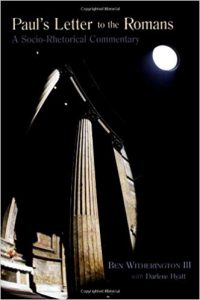
Bible scholar Ben Witherington is Amos Professor of New Testament for Doctoral Studies at Asbury Theological Seminary and on the doctoral faculty at St. Andrews University in Scotland.
He is also the author of Paul’s Letter to the Romans in the Socio-Rhetorical Commentary series.
A graduate of UNC, Chapel Hill, Dr. Witherington went on to receive the M.Div. degree from Gordon-Conwell Theological Seminary and a Ph.D. from the University of Durham in England.
He is considered one of the top evangelical scholars in the world, and is an elected member of the prestigious SNTS, a society dedicated to New Testament studies.
Dr. Witherington has also taught at Ashland Theological Seminary, Vanderbilt University, Duke Divinity School and Gordon-Conwell.
A popular lecturer, Witherington has presented seminars for churches, colleges and biblical meetings not only in the United States but also in England, Estonia, Russia, Europe, South Africa, Zimbabwe and Australia. He has also led tours to Italy, Greece, Turkey, Israel, Jordan, and Egypt.
Dr. Witherington has written over fifty books, including The Jesus Quest and The Paul Quest, both of which were selected as top biblical studies works by Christianity Today. (Links go to Amazon.)
He also writes for many church and scholarly publications, and is a frequent contributor to the Patheos website.
Along with many interviews on radio networks across the country, Witherington has been seen on the History Channel, NBC, ABC, CBS, CNN, The Discovery Channel, A&E, and the PAX Network.
7 Questions on Romans in the Socio-Rhetorical Commentary Series
Recently, Dr. Witherington kindly answered my questions about his Romans commentary. Readers will learn how this commentary came to be, what is unique about it among Romans commentaries, and how the project edified him personally.
1. What previous research and/or personal interests led you to this project and helped prepare you to write this commentary on Romans?
Romans is the most commented on book in all of human history. But oddly, when it comes to Protestant commentaries, there are almost none written from a perspective other than the Reformed perspective on the book.
I am a Methodist, and knew that another reading, a far more Arminian or Wesleyan reading of the book was possible, and needed to be offered.
2. Who is the intended audience for this commentary? Would it benefit pastors? professors? students? lay Christians in the local church?
This commentary is written for pastors and educated lay people, but it is also regularly used by seminary students as well.
3. What is unique about this commentary? What contribution does it make to studies of Romans?
This commentary is unique in two ways: A) it is the first full dress socio-rhetorical commentary on Romans, and B) it combines that with a non-Reformed reading of the theology of the book.
4. What section or passage of this commentary was particularly memorable to research and write? Why?
Particularly important is the treatment of Rom. 7-11. For instance, Rom. 7 is not about the struggle of Christians, it is a Christian view of life outside Christ, first the life of Adam in Rom. 7.6-12, and then those who have ever since been ‘in Adam’ and outside of Christ in the rest of the chapter.
Romans 8 is not about people being chosen from before the foundation of the universe to be saved or elect. It is about the destiny of those who are already in Christ— God is working things together so they will be conformed to the image of Christ in the end. Rom. 9-11 is a defense of God’s faithfulness to Jews, and in Rom. 11, Paul predicts that once the full number of Gentiles are saved by grace through faith, then in like fashion ‘all Israel will be saved’ at the return of Christ.
5. What personally edified you in writing this commentary, increasing your affections for Christ?
I enjoyed writing all of this and learned a lot. The description of the work of Christ in Rom. 3-6 in various places is inspirational.
6. Besides your commentary, what are your top recommended books (commentaries or otherwise) on Romans?
There are many interesting commentaries on Romans, both historically and in modernity. Of the older one’s Melanchthon’s rhetorical commentary is especially revealing and interesting. Of more recent ones, I especially love the English translation of Kasemann’s famous commentary on Romans. (Links go to Amazon).
Own Ben Witherington’s Romans commentary
The link provided will direct you to this volume via it’s exact ISBN number:
- Get Dr. Witherington’s commentary on Romans at Amazon
Recent Posts
David Jeremiah, a renowned pastor, author, and speaker, has captivated the hearts of many with his compelling sermons. His messages resonate deeply with diverse audiences, leaving an enduring...
Tim Keller, a distinguished pastor, theologian, and author, has garnered a devoted following through the profound impact of his sermons. In this article, we will explore seven compelling reasons...
